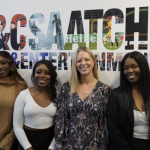I just want to start this off with a little disclaimer. The following is only my opinion of things I have seen and experienced over the past few years in Ad Land. For context, I switched careers in my late twenties to become a creative and whilst a lot about my working life has changed, it seems that some of the issues that I saw within the competitive world of broadcast media, are also prevalent in the advertising industry. I know a lot of these issues are social behaviours and some are easier to solve than others, but I think that as creatives, with the skills to influence and inform, we have some duty to help tackle the big problems.
Ad Land as a collective has raised awareness about the implications of throwing away plastics and gotten us all to recycle more and encouraged us to switch to greener alternative foods, convincing a whole generation if they’re not vegan the earth will just implode. Even though these campaigns have done great things for the world, and we should care about our environment, I do believe there is an imbalance to the things that we as humans deem worthy to go above and beyond for. In my opinion, we should carry this same energy into everything we care about if we want to see a real change in the world.
I came into advertising to change the world one campaign at a time, to change the landscape of boring adverts and reflect more of what matters.
Starting my career after the great resignation, I had a lot of hope for what advertising would offer. A lot of creatives had left the industry to pursue passion projects and in reaction, there was a shift in the language from agencies, seeming to open their doors to people like me. Agencies spoke of running courses and community projects, creating content, and learning materials, dedicated to stopping the decline in black and ethnic minority creatives. Whilst there has been increased recruitment of staff from minority backgrounds, an improvement on paper, there is much more to do.
Even the IPA’s recent 2022 school report notes how slow the industry has been to change, with the percentage of senior Black and Ethnic Minority staff low to rise, increasing just +1pp YoY and the ethnicity pay gap widening by +4.3pp despite the positive step up in minority representation across all staff. I do believe however that there are two keyways we can begin to tackle these figures.
Firstly, I believe that hiring practises need to be re-considered. There is much more we can do as agencies to prepare the next generation of black and ethnic minority candidates. For example, mentoring programmes which nurture new talent, offering more open book crits and feedback to early-stage creatives, building strong relationships right from the start. We should be taking more of an initiative to go out and be part of programs that support and nurture candidates from working class backgrounds like Brixton Finishing school and SCA 2.0 (The School of Communication Arts 2.0), making sure that we open advertising as a career path for as diverse a group as possible.
Secondly, the experience of actually being in an agency needs to be reviewed. What have agencies got in place from the jump to make new Black and Ethnic Minority junior staff members feel like they fit in and belong. Having senior staff to become mentors, is one idea to improve people’s experiences. Helping to set a clear path of progression for new joiners, building support networks, and providing a safe space to voice concerns, will really help people not only join to industry but also stay and become the leaders of tomorrow. We need people who feel confident and assured to voice their opinions, and share their experiences, in order to create work which talks to and more accurately reflects the world we live in.
We all need to make a conscious effort to construct a more accessible and appealing industry, so that when the IPA does its next agency census the BAME retention is higher than it was last year because we all know that if you embrace diversity of thought, we will be able produce greater diversity of work and that’s exactly what adverting needs right now.
By Christopher Medford



